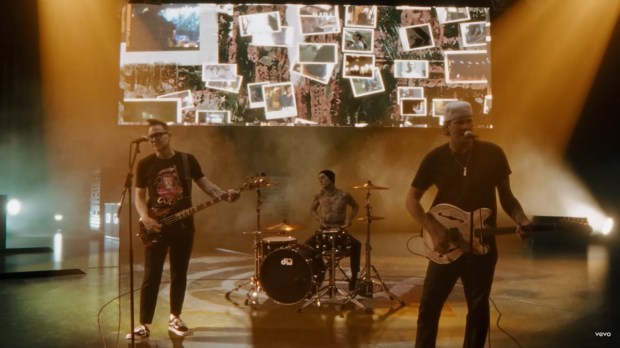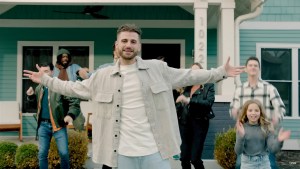Lenten Campaign 2025
This content is free of charge, as are all our articles.
Support us with a donation that is tax-deductible and enable us to continue to reach millions of readers.
Blink-182, it seems, has grown older and wiser.
I wouldn’t have counted myself among their fans, but like most millennials in the late 90s and early aughts, I also watched TRL from time to time. Songs like “All the Small Things” and “What’s My Age Again?” dominated the airwaves, and it was impossible to go far without hearing the California trio’s breezy pop-punk sound or seeing their ridiculous antics — including running naked through the streets of LA.
Note: The video below contains explicit language.
This is why their new single, “One More Time,” came as such a profound surprise. It’s the same band with the same sound, but the contrast is striking. The song opens with a scruffier and gruffer Tom DeLonge singing:
Strangers, from strangers into brothers
From brothers into strangers once again
We saw the whole world, but I couldn’t see the meaning
I couldn’t even recognize my friends
On a surface level, the lyrics are about the trio’s own tangled history: DeLonge apparently left the band in 2005, returning three years later when drummer Travis Barker almost died in a plane crash that left four other people dead. DeLonge would leave again in 2015, and again, tragedy would draw him back — this time, bandmate Mark Hoppus’ battle with lymphoma in 2021. “I wish they told us, it shouldn’t take a sickness,” Hoppus sings in the second verse, “Or airplanes falling out the sky.”
Suffering and loss, pain and death, division and distance: Life has thrown a thing or two at those kids on MTV. It hangs heavy in the song and on their faces. “It is but a superficial view of things to say that this life is made for pleasure and happiness,” St. John Henry Newman wrote. “To those who look under the surface, it tells a very different tale. … The world is sweet to the lips, but bitter to the taste. It pleases at first, but not at last.”
But this is not just a middle-aged band coming to grips with its own story, or an homage to the fans that stuck it out with them. “One More Time” looks at the big picture: the fleetingness of life and the inevitability of its ending. This is a memento mori— “remember your death” — a theme signaled in Hoppus’ tee design of a tentacled grim reaper with a skeleton face.
The power of a memento mori is not only reminding us that we must all one day face death — “We die only once,” Moliere wrote, “and for such a long time” — but also that it may come like a thief in the night, whether we have settled our accounts or not. It is a summons to be vigilant and prepared. And in this case, the band’s sights are set specifically on the grace of reconciliation. DeLonge sings:
Do I have to die to hear you miss me?
Do I have to die to hear you say goodbye?
I don’t want to act like there’s tomorrow
I don’t want to wait to do this one more time
Youth, with its wake and bakes, acts as if life never ends; age, with its aches and wakes, knows better: “Next time ain’t always gonna happen / I gotta say ‘I love you’ while we’re here.” It’s no use stewing in old resentments and grudges and silent treatments; better to go and be reconciled with your brother before making your offering.
It’s not uncommon for both sides of an argument to fancy itself righteous royalty, and the other side a wretched pauper; but whoever is which doesn’t much matter to death: “Pale death,” wrote Horace, “knocks with the same tempo upon the huts of the poor and the towers of kings.”
No, it shouldn’t take the specter of death to overcome these chasms between us, but it also doesn’t take a falling-out to create them. Millennials, despite having round-the-clock digital connectivity through social media, have also been called “the loneliest generation.” One study found that over a quarter of millennials report having no close friends; 22% said that they had no friends at all.
It’s painful to miss someone; it’s more painful still to have no one to miss or be missed by. Maybe without even intending to, “One More Time” touches on these painful depths in the generation that grew up listening to Blink. Relationships are never going to be preassembled for us or friendships automated; and where a meaningful connection is new and nascent, or at least possible, the song is also a gentle nudge to put in the time and help it grow — and not to put it off.
Blink-182 has been through it; so have the millennials who grew up listening to them. Now what? We can try to gain the world at the risk of losing what makes life meaningful, or make mercy and communion our business while there’s still time.
~
Matthew Becklo is a writer, editor, and the Publishing Director for Bishop Robert Barron’s Word on Fire Catholic Ministries. He has contributed essays for Wisdom and Wonder: How Peter Kreeft Shaped the Next Generation of Catholics and The New Apologetics: Defending the Faith in a Post-Christian Era, and edited multiple books, including The Holy Hour: Meditations for Eucharistic Adoration Word on Fire Classics Flannery O’Connor Collection. He lives in New York with his wife, Elizabeth, and their four children.



